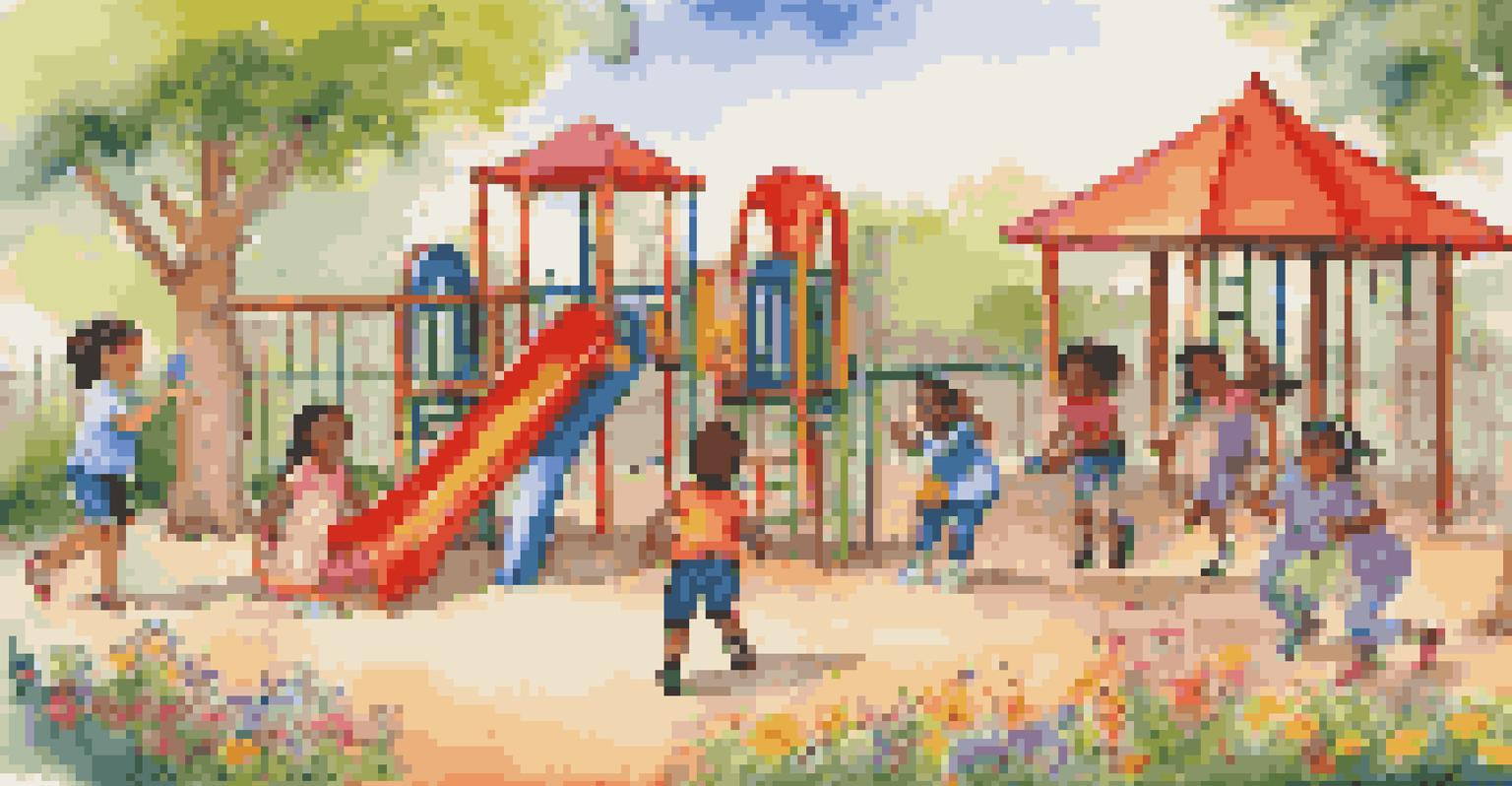Healthy Habits: Promoting Kindness in Children

Understanding the Importance of Kindness in Children
Kindness is more than just a nice gesture; it's a fundamental skill for children that shapes their emotional intelligence. When kids engage in kind acts, they not only feel good about themselves, but they also build strong relationships with peers and adults. Research shows that practicing kindness can lead to increased happiness and decreased stress, setting a positive tone for their overall mental health.
The smallest act of kindness is worth more than the grandest intention.
Children learn by watching those around them, so modeling kindness in daily life is crucial. Whether it's sharing toys, helping a friend, or simply saying a kind word, these small actions can have a big impact. Encouraging kids to notice and appreciate acts of kindness they see can reinforce this behavior and help them understand the value of empathy.
Ultimately, instilling kindness in children lays the foundation for a compassionate community. As they grow up, these habits can translate into a more caring society, where individuals look out for one another and work together for the greater good. Teaching kindness is not just about the present moment; it's about shaping a brighter future.
Simple Ways to Encourage Kindness at Home
Creating a home environment that promotes kindness starts with simple actions. Parents can model kindness through their own behavior by showing appreciation to others, practicing patience, and offering help. When children see these behaviors in their parents, they are more likely to emulate them, creating a cycle of kindness within the family.

Another effective strategy is to establish family kindness projects. For example, volunteering together at a local shelter or helping a neighbor in need can be great ways to bond as a family while instilling values of compassion in children. These shared experiences not only teach kindness but also strengthen family ties.
Additionally, praising children for kind actions can reinforce these behaviors. When parents acknowledge and celebrate acts of kindness, it encourages children to continue making positive choices. This reinforcement helps children understand that kindness is valued and appreciated, making it more likely they will choose to act kindly in the future.
Incorporating Kindness into Daily Routines
Integrating kindness into daily routines can help children internalize these habits. Simple practices, like saying 'thank you' or helping set the table, can be woven seamlessly into everyday life. By making kindness a routine part of their day, children learn to see it as a natural behavior rather than an occasional act.
Kindness is the language which the deaf can hear and the blind can see.
Morning routines can start with kindness by encouraging children to greet each family member positively. This sets a pleasant tone for the day, fostering an environment where kindness is the norm. Parents can also suggest a 'kindness jar' where family members add notes about kind acts they have done or witnessed throughout the week.
At the end of each day, discussing moments of kindness can also be beneficial. Families can share stories about kind acts they experienced or observed, reinforcing the importance of these behaviors. This reflection not only strengthens the habit of kindness but also deepens family connections.
Teaching Empathy Through Kindness Activities
Empathy is closely tied to kindness, and teaching it can be done through engaging activities. Role-playing different scenarios can help children understand how others might feel in various situations. By stepping into someone else's shoes, kids can learn to respond with kindness and compassion.
Storytelling is another powerful tool for teaching empathy. Reading books that highlight acts of kindness and their effects can spark meaningful discussions. Parents can ask questions like, 'How do you think that person felt?' or 'What would you do in that situation?' to encourage children to think about others' feelings.
Creative projects, such as making cards for friends or family members, can also foster empathy. When children create something with the intent to uplift someone else, they not only practice kindness but also learn to recognize the emotional impact their actions can have on others.
Encouraging Kindness in Social Environments
Social settings, like school or playdates, are perfect opportunities for children to practice kindness. Encouraging kids to cooperate with classmates or share toys during playtime can help them develop important social skills. These interactions are vital for teaching how kindness can enhance relationships and foster a positive atmosphere.
Parents can also talk to their children about the importance of standing up for others. Teaching kids to speak out when they see someone being treated unfairly helps them understand that kindness often means being brave. Encouraging children to be allies to their peers not only cultivates kindness but also builds a sense of community.
Additionally, creating a 'kindness club' at school, where children can share their experiences and plan kind acts, can amplify these efforts. Collaborating with peers on kindness initiatives helps solidify the idea that kindness is a shared responsibility, and it can inspire children to think creatively about how to spread kindness.
The Role of Kindness in Conflict Resolution
Teaching children how to handle conflicts with kindness can set them up for success in their interactions. Instead of resorting to anger or frustration, children can learn to express their feelings calmly and seek solutions that respect everyone involved. This approach not only resolves conflicts but also models emotional maturity.
Role-playing conflict scenarios can be an effective way to practice these skills. For instance, parents can guide children through a situation where someone feels left out, helping them brainstorm kind ways to include others. This practice helps children understand that kindness can be a powerful tool for resolving disagreements.
Additionally, discussing the outcomes of conflicts can reinforce the importance of kindness. After a resolution, parents can ask questions about how kindness helped improve the situation or how it felt to act kindly. This reflection encourages children to see the value of kindness in maintaining healthy relationships.
Celebrating Kindness: Reinforcing Positive Behavior
Celebrating acts of kindness is essential for reinforcing this behavior in children. Simple rewards, whether it's verbal praise or a special treat, can motivate kids to continue being kind. Recognizing their efforts not only boosts their confidence but also encourages them to keep spreading kindness.
Creating a 'kindness calendar' can also be a fun and engaging way to track and celebrate kind acts. Families can mark each day with a kind deed, and at the end of the month, have a small celebration to acknowledge all the kindness shared. This not only makes kindness a fun activity but also builds anticipation and excitement.

Moreover, sharing stories of kindness in the community can inspire children. Highlighting local heroes or initiatives promotes the idea that kindness is valuable and impactful. When kids see that their actions, no matter how small, can contribute to something larger, it motivates them to continue practicing kindness every day.